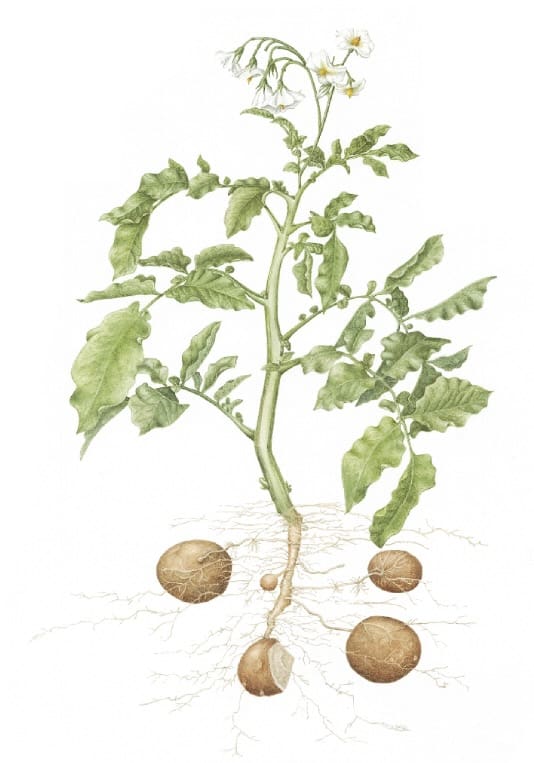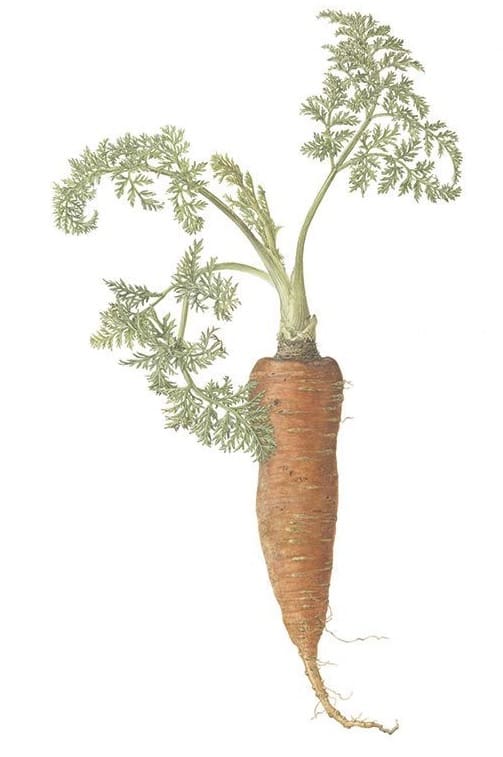Autumn

Fall, leaves, fall; die, flowers, away;
Lengthen night and shorten day:
Every leaf speaks bliss to me
Fluttering from the autumn tree.
—Emily Brontë
They looked like small pale heads, submerged in coal. The leaves had already been cut and lay motionless on the grass. Limp, yellow, green.
‘They’re potatoes,’ my mum said, kneeling next to the black container. She reached across it, her long hair dragging across the soil. It’s brown like mine, but leans into strawberry blonde, with loose, looping waves.
Mum grabbed a potato and pulled it free from its tangle of milky roots. It was covered in soil, so she brushed it off with a thumb. She smiled at me and gestured towards the container.
I approached, my small hands clammy but curious. My fingers wrapped around a potato and I flinched slightly – the soil felt like an icebox. I pulled harder than I meant to, and it came free, the web of roots spraying me with dirt.
My mum chuckled slightly and told me to be more gentle. She brushed dirt from my school jumper – fire truck red with its ocean, seagull logo – and continued to pull potatoes from the container.
I looked down at my own potato and noticed small eyes poking out from amongst the encrusted soil. I always knew they were heads, after all.
For perfect potatoes, plant them on a stormy night.
Be sure to plant your onions and potatoes
at opposite ends of the garden,
or the “onions will make the taters cry their eyes out.”
—Victorian Gardener’s Tip
I’m knelt in the grass, sifting through a pile of crunchy leaves. Reds, browns, yellows, oranges, dark greens. I wanted to find the perfect one. I did this every year.
I shivered as wind blew past me, causing my pile of leaves to shudder. I snatched hold of them, bringing them into a tight hug.
Then, I saw it, peeking out at the bottom of the pile. Burnt orange.
I grabbed it and sprung back towards our porch. I jumped the cement step, passing faded chairs, an oak table, a worn rug. I stood on my tiptoes, stretching to reach the flat head of a nail that was never hammered in properly. I drew back and smiled up at my trophy leaf, waving in the wind.
In the decay of the moon,
A cloudy morn bodes a fair afternoon.
—Devon and Dorset Rhyme
Winter

Silly gardener! Summer goes
And winter comes with pinching toes,
When in the garden bare and brown
You must lay your barrow down!
—R.L. Stevenson
Something heavy and cold slammed into my face and I screamed. I twisted to see a blonde head sprint away, a broad grin spread across her face.
‘Don’t hit me!’ I yelled, tears stinging my eyes. I blurrily scooped up some snow from the ground and hauled it at her back. She dodged it easily and flung another snowball at me. It hit my side, the brown fabric of my coat darkening in a splotch.
I darted around the apple tree, its long limbs brown and bare against the white stillness. My jeans, baggy and wide legged, were soaked now. I shivered. The jeans stuck to my skin.
My two other sisters were making our snowman nearby, with black crooked stones for eyes and half a pale carrot for the nose. It rarely snowed that much for us to make a snowman. The south of England didn’t get much snow, especially our small seaside town. So we were excited.
Mum called from the porch. She was wrapped in olive green, with her bulky black camera slung around her neck. She told us to huddle together and held the camera up.
‘Say silly sausages,’ she said. We fumbled over the words, exploding into giggles.
Carrot, cures and uses
gastric disorders
infertility
to colour butter
stimulate menstruation
relieve urinary retention
wake up genital virtue
cleanse kidneys
carrot tops as decorative hair pieces
—British customs
The couch swallowed me, pulling me deeper into its squishy chocolate cushions. My eyes were half shut, warmth from the fire soothing my cheeks. The fire guard glinted in the light. It was copper with a swirl of lilies looping above a rising sun. Original Art Nouveau. My mum loved it.
My sister nudged me as a loud scratch sounded from the back door. I scrambled up, shoving my long hair out of my face.
Orange glowed on the horizon from the big window and I peered at the glass, hand poised on the door handle. The snow had melted leaving behind a mush of white sludge. The apple tree looked frozen, the garden beds gloomy and wet. Little pots swung from the porch roof, dappled with dark water.
I opened the door and icy wind immediately washed over me. The couch groaned and moaned. Axel rushed inside, his long fluffy coat looking slightly damp. He knocked a few baubles from the tree as he ran and they rolled, red and round, to the middle of the room.
I always wished we got more snow. Especially on Christmas.
I call her the Red lily, lo she stands
From all the milder sister flowers apart;
A conscious grace in those fair folded arms
Pressed on the guileless throbbing of her heart.
—P.H. Wayne
Spring

Buttercups and daisies,
Oh, the pretty flowers;
Coming ere the Spring-time,
To tell of sunny hours.
—Mary Howitt
My mum would scoop out the flesh of an orange and put beer into its empty shell. Then she’d place the oranges in the garden beds, nestled in shallow holes.
The mornings would bring slugs and snails and I’d stare at the oranges, the sun prickling the back of my neck. Some were eagerly sliding their way forwards, a trail of sticky silk behind them. Others were already inside the oranges, drunk on liquid gold.
I now know that the brown liquid kills them – either they drown or the ethanol in the beer gets them.
I didn’t understand at the time, but it still made feel a bit uneasy.
Hypericum all bloom, so thick a swarm of flowers, like flies,
clothing its slender rods that scarce a leaf appears.
—William Cowper
Along with the apple tree, we also had a pear tree. It stood surrounded by lavender, motherwort and foxgloves. Skullcap, lamb’s-ear and bluebells. A rust coloured pot hung from one of its long branches, growing chocolate mint and spearmint.
I always wanted to try the pears and would look up at the tree longingly. A yellow fruit was just within my reach. But we weren’t allowed to eat them – mum told us they were infested with maggots and saw flies. I recoiled away from the tree, the fruit no longer appetising. I didn’t even really like pears. I still don’t.
Then I hurried across the garden, grass rough against my bare feet, to go and play with my sisters, pears forgotten.
I jumped the two steps into the back door and saw mum. She stood by the big window, trickles of afternoon light speckling her skin. She wore a lilac singlet, half her hair tied back in black elastic.
She swallowed something – a grey pill – and said it was St John’s-wort. It was a plant, she said, with beautiful golden flowers.
23rd June
Midsummer’s Eve
To protect your home against witches and evil spirits, make a garland of the ‘herbs of St. John’ – St John’s-wort, plantain, corn marigold, yarrow and ivy – and burn it on the Midsummer fire.
St John’s-wort can also be hung in bunches at your door and one may look through the flowers at the Midsummer fire and never hurt one’s eyes.
An old name for it is amber.
—British superstition and custom
Summer

Come honey-bee, with thy busy hum,
To the fragrant tufts of wild thyme come,
And sip the sweet dew from the cowslip’s head,
From the lily’s bell and violet’s bed.
—Anon
I waved my hand in front of my face, trying to disperse the charcoal cloud. My dad, who was at the back of the garden, was waving frantically too, his moustache bent into a sheepish smile. The barbeque, made from rust coloured bricks, had a mind of its own.
‘Have you had enough to eat?’ asked mum, pointing to the plate in my crossed legs. She was sat in a white plastic chair, twisting the grass with her bare feet.
Two chicken bones. Mayonnaise smeared on the side. Crumbles of potato with flecks of chive and flakes of orange nasturtium flowers. Mum gathered handfuls of them from the garden for the salad. I always liked eating the flowers.
I nodded and mum smiled, crossing her legs so that the split in her red skirt fell off her thigh. She turned to my sister beside me, who was still eating, with chicken grease smeared on her face. Sticky.
My dad swore and staggered backwards, making us all jump. Orange flames licked their way up the fence behind the barbeque, chewing through the wood.
He grabbed the nearest thing to him, my sister’s full cup of lemonade, and threw it on the fire. It went out. A collective sigh of relief rippled across the garden.
My sister screwed up her face, staring at her now empty cup. She wanted that lemonade.
The nasturtium first bloomed from the blood of a Trojan warrior.
The flower symbolises his golden helmet
and the round leaf his shield.
The nasturtium is a tasty addition to salads.
—British Folklore
His teeth were sharp and small, like snapping needles. He’d chomp happily on the water, drenching his tan and black snout.
I’d shriek and squeal and move as close as I could to the apple tree. The heart of the sprinkler stood there, shooting out its jets of cold water. Axel wouldn’t come that close.
The air was heavy with heat, but the apple tree, with very few leaves, provided a splatter of shade. Axel jumped towards me and a wave of damp dog fur hit me like a wall. I scrunched up my nose and laughed, hiding behind the tree.
The apples fitted easily into a small palm and would strip the saliva from your tongue. I’d chew on them and pull a disgruntled face. They were too bitter for me, but the novelty of home-grown apples was too enticing.
We never got many apples, but it was enough.
Here’s to thee, old apple tree!
Whence thou may’st bud and whence thou may’st blow
And whence thou may’st have apples enow!
—Twelfth Night Wassailing Song
‘Are you ready?’ asked mum, her hand wrapped around the leaves of the potato plant. I nodded excitedly, my sisters’ heads bouncing in unison.
Mum smiled and with a quick tug, pulled the plant up and out of the container. We all shrieked hysterically, gazing at the tangle of roots beneath the green. There were four potatoes – small, white and round with eyes.
Mum frowned slightly, leaning closer to look at the roots. Then she plucked each potato off, handing one to each of us. It felt cold, rough against my soft skin. I rolled it between my hands and let the soil decorate my palms.
I asked why there weren’t lots of potatoes. Like last time.
Mum smiled again, small lines forming beside her blue-green eyes. ‘Don’t worry,’ she said, ‘we can plant more seeds in the spring.’ She squeezed my arm, her fingers warm and gentle. ‘Then we’ll have lots of potatoes.’





